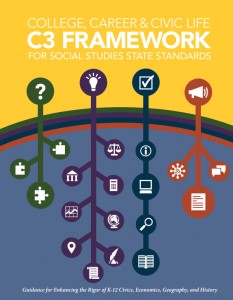States are Implementing the C3 (College, Career, and Citizenship) Framework
 In 2013, the National Council for the Social Studies published the C3 Framework for the Social Studies. The C3 is not a prescriptive set of standards, but a guide for states as they revise their own standards and other regulations, frameworks, and laws that govern social studies. It is intended to make the social studies more coherent, more challenging, and better aligned with what citizens need to learn and do.
In 2013, the National Council for the Social Studies published the C3 Framework for the Social Studies. The C3 is not a prescriptive set of standards, but a guide for states as they revise their own standards and other regulations, frameworks, and laws that govern social studies. It is intended to make the social studies more coherent, more challenging, and better aligned with what citizens need to learn and do.
One of the most innovative features of the C3 is its culminating “dimension”: Taking Informed Action. CIRCLE director Peter Levine chaired the civics writing team of the C3, and the Framework was influenced by CIRCLE’s accumulated research on k-12 civics, going back to 2001. The civics standards are consistent with the recommendations of the Campaign for the Civic Mission of Schools and its founding document, the Civic Mission of Schools report (organized by CIRCLE and Carnegie Corporation of New York in 2003). The “Taking Informed Action” dimension was also informed by the National Action Civics Collaborative, of which CIRCLE was a co-founder.
States and some large districts are now using the C3. Some refer to their process as “adoption,” but it always involves a great deal of customization to their circumstances and interests. For example:
- Arkansas recently revised its social studies curriculum frameworks, which will be implemented in August 2015. The revision committee used the C3 Framework, among other sources, and the revised documents are all aligned to the C3 Framework.
- Connecticut’s Board of Education adopted new social studies frameworks in February 2015, based on the C3.
- The District of Columbia has revised its Scope and Sequence for K-12 social studies to incorporate indicators from the C3 Framework, has provided professional development aligned with the C3, is developing assessments that incorporate C3 outcomes, and has adjusted its Building Literacy in Social Studies (BLISS) program to explicitly incorporate elements of the C3 Framework.
- Hawaii’s Department of Education is formally considering adopting the C3.
- Illinois State Superintendent Christopher Koch began a process of updating the state’s history and social science standards in 2014 and asked for the social sciences to be guided by the C3. As Tom Chorneau reports, “A big part of the revision in Illinois will focus on civics learning, as the standards task force organized by the superintendent will be led by the Illinois Civic Mission Coalition.”
- In Kentucky, a writing team has been drafting Social Studies Standards for the Next Generation. They are drawing on the the C3 Framework, the Global Competence Matrix, and 21st Century Skills for Teaching and Learning, among other documents. They hope to present the results to the Kentucky Board of Education in April for consideration of implementation next school year.
- Maryland has begun writing a new Maryland Social Studies Framework for pre-k-12 based on the C3 Framework. Maryland is also using C3 in professional development.
- New York State’s Board of Regents has adopted a new K-12 Social Studies Framework that draws explicitly on C3. New York also provides a C3 Toolkit helpful for people implementing at any level, from their classroom to a state.
- North Carolina will not begin its regular revision of social studies standards until 2015-2016, but the state is using the C3 as a curriculum framework and has conducted professional development to help teachers use it.
As we have previously written, adoption of the C3 Framework is a positive step toward improving civic education in our schools. The lessons learned from its implementation and, eventually, its impact on students will inform critical ongoing debates about how to best educate informed and engaged youth.





